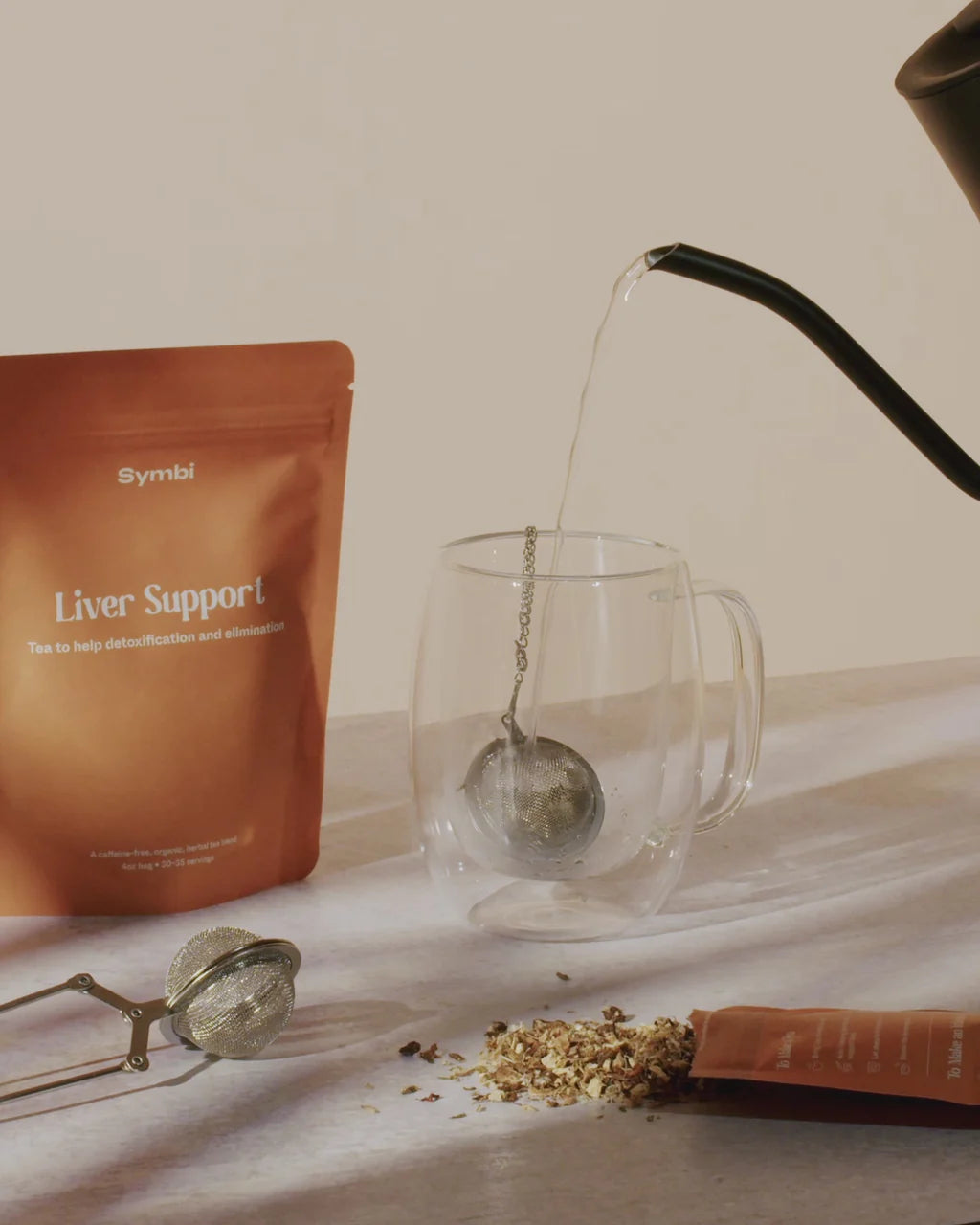
Detox Your Liver Naturally: Hormones, Toxins, and Symbi Liver Support Tea
Share
Understanding Liver Stagnation: The Impact of Toxins on Health
The liver is one of the body’s most vital organs, responsible for detoxification, metabolism, and hormone regulation. However, it faces a constant barrage of toxins from various sources, which can lead to liver stagnation. Understanding these burdens and how to support liver health is crucial for maintaining overall well-being.
The Burden of Toxins on the Liver
Every day, our livers work tirelessly to filter out harmful substances. From environmental pollutants like heavy metals and pesticides to chemicals found in household products, food additives, and even personal care items, our bodies are constantly exposed to potential toxins. Here are some common sources:
- Processed Foods: Often high in preservatives, artificial flavors, and other additives.
- Environmental Pollutants: Airborne toxins from factories, vehicles, and smoke.
- Household Chemicals: Cleaning agents, fragrances, and pesticides.
- Medications: Many pharmaceutical drugs can place an extra burden on the liver during metabolism.
- Mold Exposure: Mold can produce mycotoxins that disrupt liver function and overall health.
When the liver becomes overloaded with these toxins, its ability to function effectively diminishes, leading to potential health issues, including fatigue, digestive problems, hormonal imbalances, and skin issues.
The Connection Between Liver Health and Hormones
The liver plays a crucial role in metabolizing hormones, including estrogen, testosterone, and thyroid hormones. When the liver is sluggish, hormonal imbalances can occur, manifesting as mood swings, irregular menstrual cycles, and fatigue. Additionally, mold exposure has been linked to hormonal disruptions, making liver support even more critical in environments where mold is present.
Supporting Liver Health Naturally
To combat these challenges, it’s essential to support liver function with natural remedies. Symbi Liver Support Tea is specially formulated to help detoxify the liver gently while providing a range of health benefits, including improved skin health.
Key Ingredients:
- Burdock Root: Known for its detoxifying properties, burdock root helps eliminate toxins and impurities from the liver.
- Dandelion Root: Promotes healthy liver function and bile production, offering additional cleansing support.
- Red Clover Herb: Provides antioxidant benefits to protect the liver from oxidative damage while adding a hint of sweetness. Its skin-supporting properties help improve overall skin appearance.
- Ginger Root: With its warming properties, ginger aids digestion and circulation, enhancing the liver’s ability to process and eliminate toxins effectively, which can reflect positively on skin health.
- Marshmallow Root: This soothing herb reduces inflammation and irritation in the digestive tract, promoting efficient digestion and indirectly supporting liver health.
Key Benefits of Symbi Liver Support Tea:
- Supports normal toxin metabolism
- Increases bile flow
- Promotes hormone health
- Enhances energy levels
- Supports skin health and appearance
Symbi 100% organic herbal tea is caffeine-free and free from fillers, additives, or sweeteners, making it an excellent choice for anyone looking to nourish their liver and support overall vitality. Enjoy 1 to 3 cups daily of this earthy and spicy blend to help your body combat the constant onslaught of toxins.
Why Choose Symbi Liver Support Tea?
Crafted by an experienced herbalist, our Liver Support Tea is the #1 bestselling tea because it combines gentle, effective herbs to promote liver function, hormone balance, and overall wellness, including healthier skin.
➡️ Shop Symbi Liver Support Tea Here
*As always, these statements have not been evaluated by the Food and Drug Administration. This product is not intended to diagnose, treat, cure, or prevent any disease. Consult your healthcare provider before using herbal products, especially if you are pregnant, nursing, taking medication, or have a medical condition.
Supporting Resources:
2. Maffini, M.V., et al. (2006). “Hormonal and environmental exposure: an ecological model.” Endocrine Reviews, 27(4), 409-423. PubMed
3. Lamas, M.J. et al. (2020). “Endocrine Disruptors and Hormonal Health.” Frontiers in Endocrinology, 11, 1-14. PubMed
4. Bissell, M.J. et al. (2019). “The Role of the Liver in Skin Health.” Journal of Investigative Dermatology, 139(2), 217-222. PubMed
5. Liao, M. et al. (2015). “Protective effects of burdock root on liver injury.” BMC Complementary and Alternative Medicine, 15, 118. PubMed
6. Cha, H.J. et al. (2009). “Dandelion: A promising herb for liver protection.” World Journal of Gastroenterology, 15(47), 5906-5914. PubMed
7. McClain, C.J. et al. (2006). “The role of red clover in liver health.” Journal of Nutrition, 136(4), 1019S-1022S. PubMed
8. Grzanna, R. et al. (2005). “Ginger—an herbal medicinal product with broad anti-inflammatory actions.” Phytotherapy Research, 19(9), 801-810. PubMed
9. Barrett, B., et al. (2003). “Marshmallow root: An overview of its properties.” Journal of Alternative and Complementary Medicine, 9(3), 427-434. PubMed
